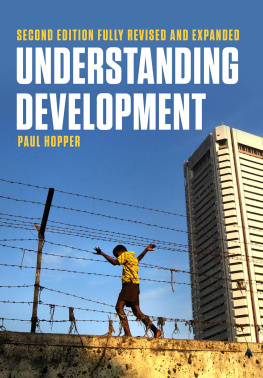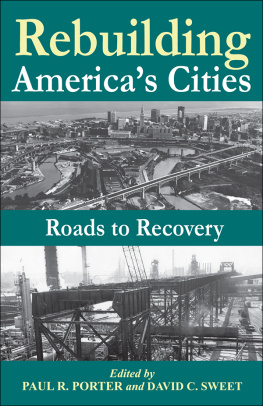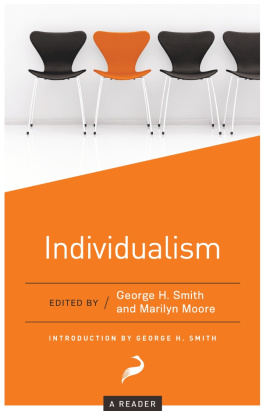First published 2003 by Ashgate Publishing
Published 2017 by Routledge
2 Park Square, Milton Park, Abingdon, Oxon 0X14 4RN
711 Third Avenue, New York, NY 10017, USA
Routledge is an imprint of the Taylor & Francis Group, an informa business
Copyright PaulHopper2003
All rights reserved. No part of this book may be reprinted or reproduced or utilised in any form or by any electronic, mechanical, or other means, now known or hereafter invented, including photocopying and recording, or in any information storage or retrieval system, without permission in writing from the publishers.
Notice:
Product or corporate names may be trademarks or registered trademarks, and are used only for identification and explanation without intent to infringe.
British Library Cataloguing in Publication Data
Hopper, Paul
Rebuilding communities in an age of individualism
1. Community 2. Social capital (Sociology) 3. Individualism
I. Title
Library of Congress Cataloging-in-Publication Data
Hopper, Paul, 1963-
Rebuilding communities in an age of individualism / Paul Hopper.
p. cm.
Includes bibliographical references and index.
ISBN 0-7546-1438-7
1. Community life. 2. Individualism. 3. Community development. I. Title.
HM761 .H662002
307--dc21
2002038262
ISBN 13: 978-0-7546-1438-8 (hbk)
The focus of this book is upon the condition of community and social life in Western societies. It is an area that is receiving increasing attention, with many commentators maintaining that we are witnessing the erosion of social capital. The concept of social capital has been variously interpreted and employed, but is understood here in its broadest sense as essentially the glue that binds or holds societies together, and enables them to function effectively. There needs to be, for example, habits and attitudes of sociability, co-operation and reciprocity in order to generate trust, social solidarity and civic engagement that is, social capital within a society. And local communities or neighbourhoods are important arenas where such attitudes and behaviour can develop. Yet it will be argued they face considerable challenges in the contemporary period. It is for this reason that this work is concerned with how we can maintain and revive local communities and community life in these increasingly individualistic times.
The book is divided into two parts. In ).
A lack of stability and security, and concomitant feelings of anxiety and uncertainty, is not of course a universal experience. Some people are doing very well under current conditions: they might enjoy financial security, be confident about employment prospects, belong to caring and supportive families, and so on. There are also arguments which will be addressed later that recent developments are liberating and empowering, and provide us with greater control over our own lives. But it will be stressed there is widespread concern about such matters as job security, welfare provision, rising crime, drugs, the loss of community, the break-up of families, the decline of morality and the excessive pursuit of self-interest (see Blair, 1996; Etzioni, 1995a, 1997b; Gray, 1993).
Identifying insecurity and individualism in our own time is not meant to imply that Western societies were once harmonious, integrated and cooperative places in which to live. Whether such societies existed in the past, and if so when, has generated much research and remains a source of debate (see Black, 1984; Durkheim, 1964; Gierke, 1900; Parsons, 1951; Tnnies, 1957). Indeed, some commentators are deeply sceptical of the notion that Western societies were more integrated in the past (see Archer, 1988; Abercrombie, 1980; Laslett, 1965). For example, Abercrombie and his colleagues (1980) contend that factors such as poor or non-existent communications and transport systems undermined social integration in the pre-modem period.
While the primary processes of late modernity encourage greater individualism, this manifests itself to varying degrees within different Western democracies. In part, this is because these are not uniform processes affecting all societies in the same manner; their impact and the responses they provoke will therefore be uneven. It is also the case that the national cultures of these societies will shape the nature of this interaction. These points, and above all this complexity, should be taken into account with the analysis presented in , which is based upon identifying and describing broad trends.
The justification for this approach is that these are powerful forces likely to produce similar outcomes, often overriding national cultures. Moreover, all advanced industrial societies are in some way experiencing these processes, and cannot remain immune to them. Consequently, even those societies often considered rich in social capital, such as Germany, may well have to confront its diminution in the future. Likewise, Asian societies like Japan and South Korea may find aspects of their social and cultural life, such as the family and respect for authority, under increasing pressure from these developments.
Having outlined the challenges facing local communities, in ).
An Age of Individualism
From the outset it is necessary to define key terms and concepts, and in this respect the definitions provided by The Concise Oxford Dictionary (1990, 8th edition) will be employed. Individualism is defined as:-
the habit or principle of being independent and self-reliant. a social theory favouring the free action of individuals. self-centred feeling or conduct; egoism. (8th edition, 1990: 602)
As this book concentrates upon society, rather than social theory, individualism will be understood to mean the habit of being independent and self-reliant; behaviour that can lead to self-centred feeling or conduct.
The reason for defining individualism is because it is receiving increasing critical attention, often in relation to individualization (see Bauman, 2001; Beck and Beck-Gemsheim, 2002). Some of this discussion has centred upon interpreting the meaning of these concepts. In this regard, Ulrich Beck and Elisabeth Beck-Gemsheim (2002) view individualization as a structural concept; that is, in the sense of it being institutionalized individualism. To paraphrase them, certain institutions of modern society such as paid employment are now geared to the individual and not to the group. They contend that ongoing individualization is destroying the given foundations of social coexistence, but view it as becoming the social structure of second modern society itself (2002, xxii; emphasis in original). As will be seen, there is some common ground with the claims made here. In this book, it is argued that the primary processes or developments of late modernity are producing profound changes by undermining existing social structures, institutions and practices, which in turn is encouraging greater individualism.
Finally, it needs to be made clear what is meant in this work by an age of individualism. It is not the intention to deny or ignore the fact that there might be a history of individualism within many Western societies. For example, Alan Macfarlane in his classic work













